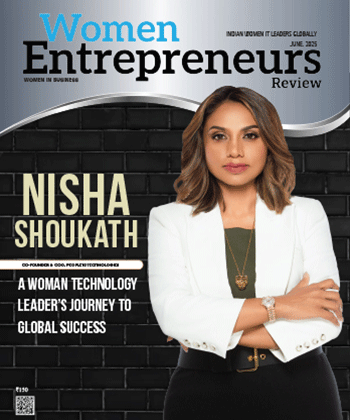
How AI is Redefining Consumer Engagement & More in Health Insurance
By: Sapna Desai, Chief Marketing Officer, ManipalCigna Health Insurance
Sapna drives Marketing and Brand Strategy at ManipalCigna, overseeing Consumer Insights, Digital Marketing, and Corporate Communication. With extensive experience across direct, mass, and digital marketing, she has held leadership roles at Ogilvy, ING Life, ISB, and BPL Mobile.
In a thought-provoking interaction with Women Entrepreneurs Review Magazine, Sapna shared her insights on the evolving landscape of health insurance marketing, shifts in customer behavior, balancing data personalization with privacy, AI-driven advancements in segmentation, engagement strategies, and untapped opportunities for competitive advantage.
With AI-driven marketing tools transforming consumer engagement in healthcare, how do you assess the current landscape in health insurance marketing? What shifts have you observed in customer behavior and their expectations from health insurance providers?
Hyper-personalized customer experiences are being created in the health insurance sector through artificial intelligence-powered marketing tools. Customers today are better informed and digitally savvy. They expect health insurers to recommend suitable healthcare options through personalized marketing, provide real-time assistance, and offer a seamless digital journey. There is now a clear trend towards proactive health management, with customers looking for wellness programs and preventive care under the plan.
AI has revolutionized health insurance marketing by enabling hyper-personalized customer engagement. Today’s customers expect tailored solutions, transparency, and seamless experiences across platforms.
At ManipalCigna, we are seeing an increasing shift toward digital-first interactions, where convenience and real-time support are paramount. AI tools empower us to craft targeted campaigns like Mini Mindful Moments, which uses AI-driven guided meditations to address mental wellness for millennials. This campaign resonates with distinct audience segments, increasing engagement and building brand trust. AI tools have empowered health insurers to better understand customer needs, offering products and services aligned with their health and financial goals.
In a highly regulated industry like healthcare, how do you balance data personalization and maintaining patient privacy, especially when using AI to drive marketing efforts?
Data security is foundational in healthcare marketing. By adopting privacy-first AI models and adhering to stringent compliance frameworks, we ensure data usage remains ethical and secure. AI's potential for segmentation is immense. For example, predictive modeling can identify users likely to purchase specific health plans, enabling personalized communication. However, transparency is key. AI can take segmentation to further levels, providing a deeper understanding of patterns in anonymized datasets, such as micro-segmentation based on health risk, lifestyle, or personal preferences, without compromising individual identities.
As AI improves, including behavioral and contextual data in those calculations will push targeting strategies further toward hitting the sweet spots that allow for health insurers to be in alignment with unique customer journeys. Transparency in the usage of data, in turn, will play a huge role in the building of trust and also ensure ethical marketing practices.
How can hospitals and insurers leverage AI to predict health trends, policy preferences, or even health risks? How is this influencing hospitals’ approach to marketing health insurance products?
AI-powered predictive analytics has immense potential in forecasting health trends, policy preferences, and even individual health risks. For example, analyzing population health trends allows us to tailor policies to address prevalent conditions such as diabetes or cardiac issues. Similarly, predictive tools can identify individuals at higher health risk, and timely interventions and personalized health plans can be undertaken. At ManipalCigna, this has shaped offerings like our ManipalCigna Sarvah Plans, designed for comprehensive coverage. By combining health trends and individual profiles, AI is transforming marketing into a consultative approach.
The industry today is increasingly focusing on preventive healthcare, stressing the importance of regular health check-ups, healthy lifestyle, and preventive measures. Predictive models also allow hospitals and health insurers to co-create preventative care programs, reducing out-of-pocket expenses for patients – a critical factor since 67% of healthcare costs are self-funded. AI makes this preventive healthcare a reality by predicting the health trends of individuals and identifying risks before it’s too late.
How can health insurers use AI to enhance post-purchase customer engagement and retention? What are some underexplored opportunities in this space that could offer a competitive advantage?
AI can revolutionize post-purchase engagement with proactive, meaningful touchpoints. It can help answer customer’s questions about claims queries, policy renewals, and wellness tips in real-time. For instance, AI chatbots ensure 24/7 assistance, addressing queries like claim processes or policy renewals. Predictive analytics can determine when customers are likely to lapse on payments or renewals, which can send timely nudges. Furthermore, health trackers and telemedicine services that can be seamlessly integrated with policies will serve as perpetual value across the coverage.
The use of AI to personalize wellness incentives and gamify health behaviors can help activate more customers to engage with their policies. This enhances retention and brings forth the health insurer as a proactive partner on the customer's health journey, thereby ensuring sustainable loyalty.
How are consumer expectations around health insurance products shifting due to the rise of digital health tools and AI-driven personalization? What should health insurance companies be doing now to stay ahead of these trends?
The rise of digital health tools has made consumers demand greater integration of wellness and insurance. They expect health insurers to move beyond the basic coverage of diseases with an aim toward holistic health management. AI personalization has amplified such shifts through customized policy recommendations, dynamic premium structures based on lifestyle data, and instant digital servicing. Data transparency and clear value propositions from AI-driven insights will be key to meeting the aspirations of changing expectations and building trust with customers in a competitive landscape.
At ManipalCigna, we have launched several marketing campaigns that utilize AI tools for content creation and engagement. For instance, our "Mini Mindful Moments" campaign used generative AI to produce guided meditation content aimed at promoting mental well-being during International Yoga Day. Additionally, the "Mere Choice ka Health Insurance" is a campaign targeting young adults, emphasizing financial security through health insurance as they navigate adulthood.
To stay ahead, insurers must prioritize agility and innovation. Solutions like telehealth integration, wearable data utilization, and AI-powered self-service portals are the future. At ManipalCigna, we believe in aligning products with evolving expectations, as showcased in our marketing campaigns and flexible plan structures. Anticipating trends and embracing digital transformation is the way forward.






